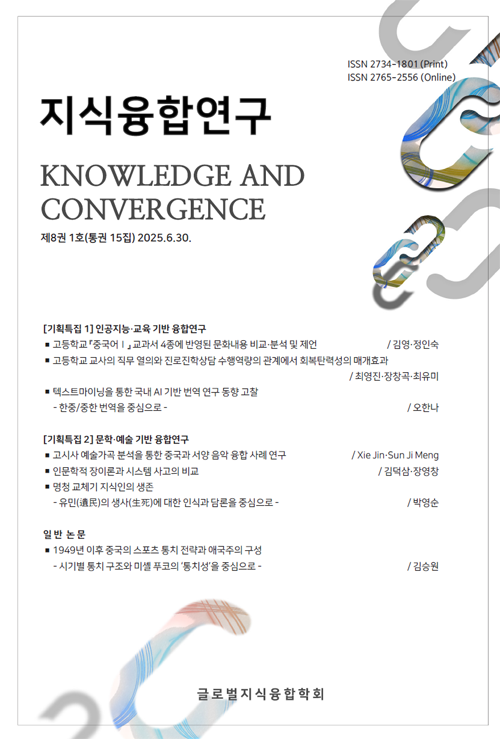- 영문명
- The Survival of Intellectuals in the Ming-Qing Transition - Focusing on the Perception and Discourse on the Life and Death of the Adherents of a former dynasty
- 발행기관
- 글로벌지식융합학회
- 저자명
- 박영순(Youngsoon Park)
- 간행물 정보
- 『지식융합연구』제8권 제1호, 153~184쪽, 전체 32쪽
- 주제분류
- 복합학 > 학제간연구
- 파일형태
- 발행일자
- 2025.06.30
6,640원
구매일시로부터 72시간 이내에 다운로드 가능합니다.
이 학술논문 정보는 (주)교보문고와 각 발행기관 사이에 저작물 이용 계약이 체결된 것으로, 교보문고를 통해 제공되고 있습니다.

국문 초록
본 논문은 명청 교체기 유민(遺民)의 생사(生死)에 대한 인식과 담론에 대해 분 석했다.
전(前) 왕조에 의해 남겨진 유민들에게 가장 현실적인 고민은 신분 정체성에 대 한 문제일 것이다. 생존 방식에 대한 인식과 결단이 필요했던 이유이다. ‘나는 누구 인가’라는 생존에 관한 물음은 이족(異族)의 배타적 정서가 작동하는 환경 속에서 유민들의 사회적 신분과 자기 정체성을 검증하는 것이자, 사인으로서의 사회적, 도 덕적 역할을 증명받는 것이기도 했다. 따라서 명청 교체기는 화이(華夷) 왕조의 전 환기에 놓인 사인, 유민들의 신분 정체성과 생존 방식 및 생사관(生死觀)에 대한 논 의가 중요한 담론이 되었다.
명청 교체기 유민들의 지배적인 생사 관념은 주로 군신(君臣) 관계를 중시한 ‘군 신지의(君臣之義)’였다. ‘군주가 망하면 신하도 망한다.’는 군망여망(君亡與亡)’의 사 절(死節)이 중심을 이루었다. 한편, 유민의 도선(逃禪) 현상은 명청 교체기에 특히 성행했고 유민의 주요 생존 방식 중의 하나였다. 하지만 ‘군주가 망하면 신하도 망 한다.’는 측면에서 보면, 도선을 택한 유민들은 ‘죽어야 마땅하나 죽지 않은 사람들’ 이 된다. 그들의 생존은 사회적으로 합법적 인정을 받기 어려운 것이다.
그렇다면, ‘군신지의’는 과연 유민의 생사 문제와 생존 방식을 결정짓는 도덕적 기준이자 절대적 가치인지, 명말의 사인과 유민은 생사에 대해 어떻게 인식하였는 지, 죽음과 생존의 가치를 어떤 기준으로 평가할 수 있는지 등에 대한 문제가 제기 된다.
본고는 이러한 문제의식 속에서 명청 교체기 유민의 생사관에 대해 분석하였 다. 죽음의 사절(死節)과 생존의 도선(逃禪)을 두 축으로 설정하고, 명말 생사관의 주요 논점인 ‘필사(必死)’-‘불필사(不必死)’-‘도통(道統)’의 명제를 통해, 생사 담론의 전 개, 생사에 대한 인식, 사인의 역할과 정체성 및 생사관의 함의 등에 대해 분석하였 다. 이러한 분석을 통해, 명청 교체기 존망(存亡) 위기에 유민들의 생존과 죽음에 대 한 인식과 함의를 분석함으로써, 명청 교체기 생사관에 대한 균형적인 이해를 제시 하고자 했다.
영문 초록
This text is intended to analyze the theme of the understanding and discussion of the life and death of the adherents during the transition period of Ming and Qing Dynasties.
For the adherents remained by the former Dynasty, the most realistic concerns might be their identity, which was the reason to understand and make decision on living style. Questioning about survival as ‘Who am I ?’ was just authentication for the identity of the adherents and also was being testified with their social and moral role in the atmosphere being ruled by an alien race. Therefore, discussion on the identity of private and adherents, survival style and the view of life and death in the period of dynastic transformation between Chinese and alien race, i.e., the change between Ming and Qing Dynasty, become an important issue.
The dominant view of the life and death of the adherents in the period of change of Ming and Qing dynasty was the Righteousness of Kings and Ministers which attaches importance to monarch-subject relationship. The central idea is dying for the sake of honor as ‘downfall of the ruler and the downfall of the ministers.’ On the other hand, the phenomenon of adherents fleeing to Zen Buddhism is prevalent in the period of change of Qing and Ming Dynasty, which became one of major survival ways. With reference to ‘downfall of the ruler and the downfall of the ministers’, the adherents who selected to flee to Zen Buddhism became those ‘should die but not died’. Their survival was difficult to receive legal recognition socially.
Then, such issues as that, is the Righteousness of Kings and Ministers could be the moral standards and absolute value which could determine the life and death and the living issues with the adherents, how the privates and adherents at the end of Ming dynasty understood the life and death, and how the value of death and living could be assessed, with what standards, and so on, would be subjected.
With such understanding, this text will make an analysis on the view of life and death of the adherents in the period of change of Ming and Qing dynasty. The analysis will be made on the development of discussion of life and death, recognition whereof, and the meaning of the view of life and death, with the proposition as ‘Must die’, ‘Not must die and Confucian orthodoxy which were major arguments on life and death at the end of Ming dynasty, and with two axes as Death and Flee to Zen Buddhism set up. Through such analysis, that is to analyze the recognition and meaning on the life and death of the adherents facing the crisis of death, this text is desired to present a balanced understanding on the view of life and death in the period of change of Ming and Qing dynasty.
목차
1. 머리말
2. 생사에 대한 인식과 논의
3. 생존에 대한 고통과 이유
4. 생존의 사회적 역할과 정체성
5. 생사관의 다의적 함의
6. 맺음말
키워드
해당간행물 수록 논문
- 텍스트마이닝을 통한 국내 AI 기반 번역 연구 동향 고찰 - 한중/중한 번역을 중심으로
- 고등학교 『중국어Ⅰ』 교과서 4종에 반영된 문화내용 비교·분석 및 제언
- 고등학교 교사의 직무 열의와 진로진학상담 수행역량의 관계에서 회복탄력성의 매개효과
- 고시사 예술가곡 분석을 통한 중국과 서양 음악 융합 사례 연구
- 인문학적 장이론과 시스템 사고의 비교
- 1949년 이후 중국의 스포츠 통치 전략과 애국주의 구성 - 시기별 통치 구조와 미셸 푸코의 ‘통치성’을 중심으로
- 명청 교체기 지식인의 생존 - 유민(遺民)의 생사(生死)에 대한 인식과 담론을 중심으로
참고문헌
관련논문
복합학 > 학제간연구분야 BEST
- 숏폼 미디어 몰입이 집중력에 미치는 영향에 관한 연구: 20대 청년을 대상으로
- 딥페이크(Deepfake) 영상물에 관한 법적 대응조치 검토
- 전공자율선택제(무전공제) 현황과 운영의 방향성
복합학 > 학제간연구분야 NEW
더보기최근 이용한 논문
교보eBook 첫 방문을 환영 합니다!

신규가입 혜택 지급이 완료 되었습니다.
바로 사용 가능한 교보e캐시 1,000원 (유효기간 7일)
지금 바로 교보eBook의 다양한 콘텐츠를 이용해 보세요!



